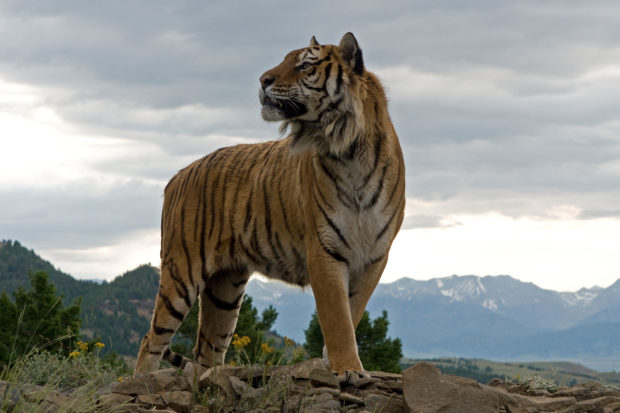
China’s retrogressive move to allow the sale of tiger and rhino parts for “medicinal use” opens up a legal market for the sale of these products, at a time when both tigers and rhinos are hovering on the brink of extinction. Photo by Alamy
China has sent out conflicting messages over the past few weeks over its decision to lift a 1993 ban on the sale of tiger bones and rhino horns for medicinal use. Last month, its government formally rescinded the ban, and then earlier this week, a spokesperson suggested that the country might reinstate the ban. But the devil, as always, is in the details, and without a permanent ban in place, there is no guarantee that China will indeed continue to respect global efforts to conserve two of the world’s most at-risk species. That is why we are asking the Trump administration to impose trade sanctions on China until it amends its law to reinstate a complete ban on the sale of tiger and rhino parts.
The Humane Society of the United States, Humane Society International, Humane Society Legislative Fund, and the Center for Biological Diversity this week filed a legal petition with the U.S. secretary of the interior and the U.S. secretary of state requesting that the United States prohibit imports of fish and wildlife products from China under the Pelly Amendment, which allows the president to impose such sanctions against a country that is undermining an international conservation treaty. China’s retrogressive move to allow the sale of tiger and rhino parts for “medicinal use” opens up a legal market for the sale of these products, at a time when both tigers and rhinos are hovering on the brink of extinction.
In 1993, the United States certified China over that country’s continued trade in tiger bone and rhino horn under Pelly, a law approved in 1978 that authorizes the president to take action when the secretary of the interior, in consultation with the secretary of state, certifies that nationals of a foreign country are engaged in trade or take that diminishes the effectiveness of an international program that the United States also enforces for the conservation or endangered or threatened species.
At the time, China agreed to enact the relevant conservation measures on tiger bone and rhino horn trade and trade sanctions weren’t imposed. However, these are the same measures that China has now rescinded, at a time when tigers and rhinos are at even greater risk than they were in 1993.
Our petition calls for a U.S. ban on wildlife imports that China routinely exports to the United States, including several species of squid, macaque monkeys, bullfrogs, snakes, octopus, abalone and oyster, which are the most profitable wildlife exports from China to the United States.
China said the tiger and rhino parts and products for sale would be derived from so-called “farms” where these endangered species are bred for commercial purposes. These places breed thousands of captive rhinos and tigers so their bones and other body parts can be sold for tiger bone wine and other “medicinal” products. They are not only unethical and cruel, but it’s also the case that a market for rhino and tiger products in China will undoubtedly lead to the poaching of these animals in the wild. With just 30,000 rhinos and less than 3,500 tigers left in the wild, this is a risk we cannot afford to take. Tigers and rhinos are majestic wild animals who should not be bred for profit.
The international community has uniformly recognized that swift action is needed to protect tigers and rhinos from the threat of commercial trade and poaching before it’s too late. Many countries globally, including the United States, outlaw the sale of tiger and rhinoceros parts and products for alleged medical benefit. There is no scientific evidence supporting the touted benefits of these products for conditions ranging from hangovers to cancer and insomnia to arthritis, and HSI has worked for years to educate consumers about the facts and turn people’s thinking away from such false beliefs.
In recent years, China has made efforts to portray itself as a global leader on conservation, with the country enacting a ban on the commercial ivory trade in 2017: this was a move that global animal protection and environmental groups welcomed. But this latest move on tigers and rhinos is irresponsible and it is one that the world’s wildlife cannot be permitted to suffer. It needs to be met by the rest of the world, and particularly by the United States, with the harshest condemnation and, as we’ve argued in our petition, with action.
Urge the United States to hold China accountable for lifting a ban on rhino and tiger parts
The post U.S. should impose trade sanctions against China for lifting ban on tiger and rhino parts trade appeared first on A Humane Nation.
Enviroshop is maintained by dedicated NetSys Interactive Inc. owners & employees who generously contribute their time to maintenance & editing, web design, custom programming, & website hosting for Enviroshop.
